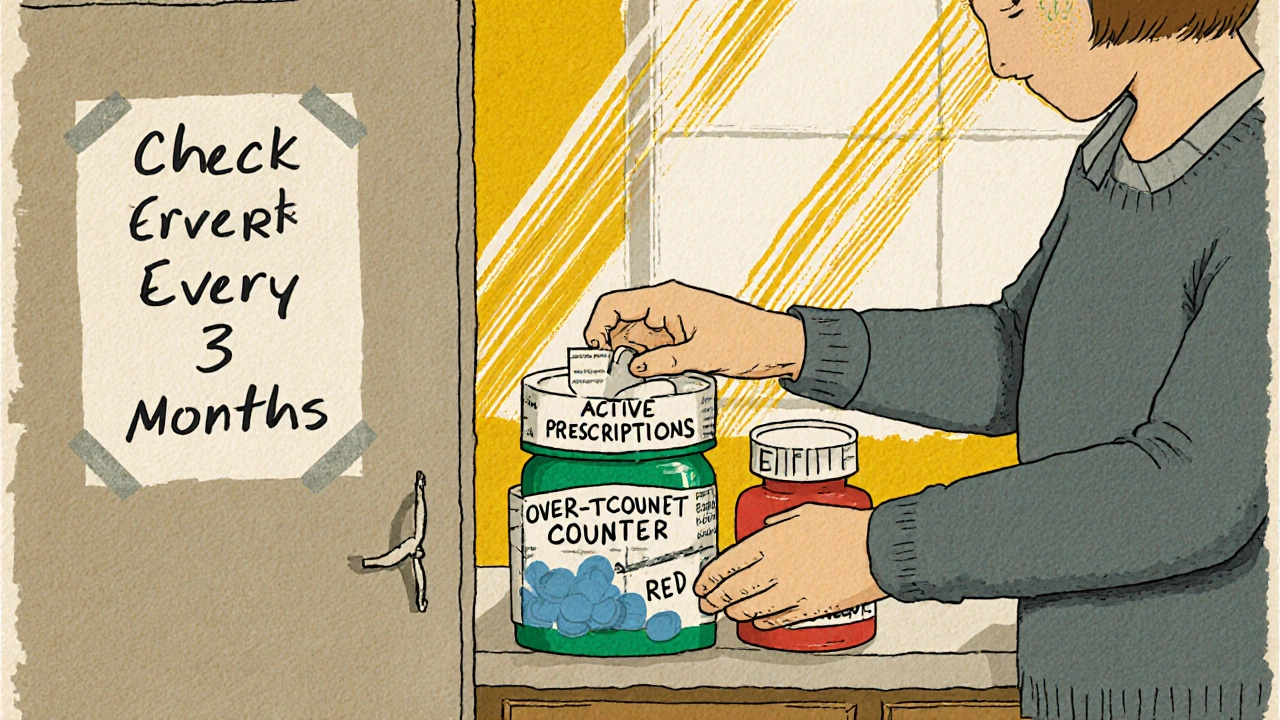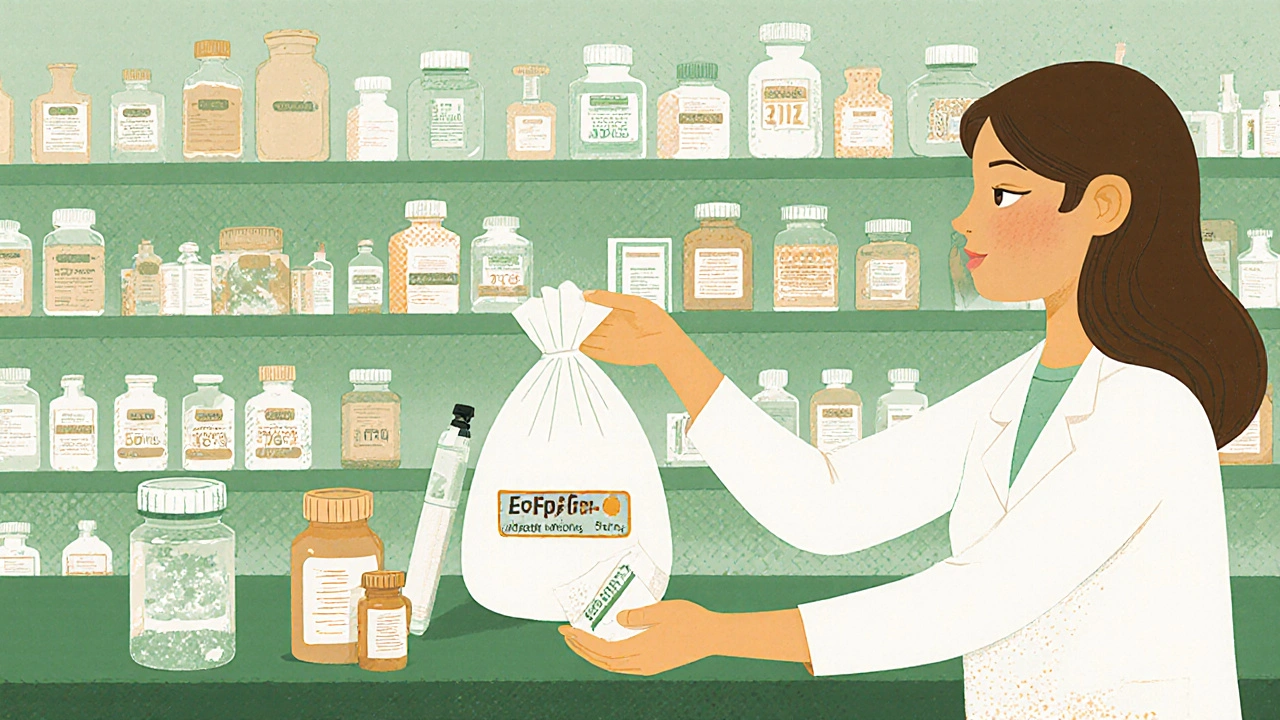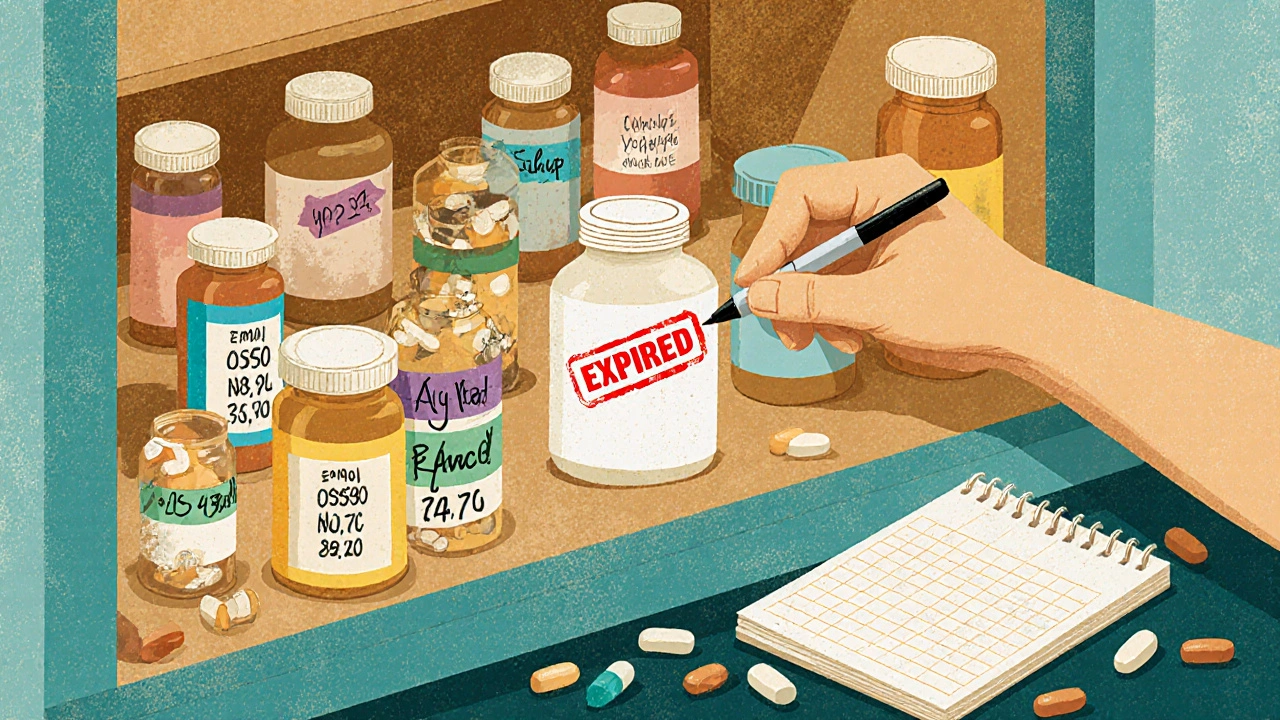Every year, millions of people in the UK keep medicines past their expiration date-often without realizing it. A pill that’s safe and effective one year might be useless-or even harmful-the next. The medication expiration date isn’t just a suggestion. It’s the last day the manufacturer guarantees the drug will work as intended. Keeping expired meds in your cabinet isn’t just messy; it’s risky.
Why expiration dates matter more than you think
Medications don’t suddenly turn toxic on their expiration date, but they do lose potency. A 2023 study from the UK’s Medicines and Healthcare products Regulatory Agency (MHRA) found that some antibiotics and insulin can drop below 90% effectiveness within six months after expiration. For life-saving drugs like epinephrine auto-injectors or heart medications, even a small drop in strength can be dangerous. Expired painkillers might not relieve your headache. Old allergy meds might not stop a reaction. And if you’re taking something for a chronic condition-like high blood pressure or thyroid disease-skipping a dose because your pill doesn’t work could lead to serious complications. The problem? Most people don’t check. A 2024 survey by the Royal Pharmaceutical Society found that 68% of UK households still keep expired medicines in their bathroom cabinets, kitchen drawers, or bedside tables. That’s not just clutter-it’s a hidden health hazard.What to do with expired medicine
Never flush pills down the toilet or toss them in the trash without taking steps to make them unusable. The UK’s National Health Service recommends returning expired or unwanted medicines to your local pharmacy. Most pharmacies offer free take-back programs, and they’re legally required to dispose of them safely. If you can’t get to a pharmacy right away, here’s what to do at home:- Take the pills out of their original packaging.
- Mix them with something unappetizing-used coffee grounds, cat litter, or dirt.
- Put the mixture in a sealed plastic bag or container.
- Throw it in your general waste bin.
How to track expiration dates without tech
You don’t need a smart cabinet or an app to stay on top of this. A simple, low-tech system works just as well-and it costs nothing. Start by emptying your medicine cabinet completely. Sort everything into three piles:- Active prescriptions (currently being used)
- Over-the-counter meds (painkillers, antihistamines, etc.)
- Expired or unused

Use a simple tracker sheet
Print out a small table or use a notebook. Create three columns:- Medication name
- Expiration date
- Next check date
What to watch out for
Some medicines are more sensitive than others. Here are a few to pay extra attention to:- Insulin - Loses potency quickly after opening. Most last 28 days once opened, even if the bottle says otherwise.
- Antibiotics - Never use leftover antibiotics from a previous infection. They won’t work the same way, and they can cause resistant bacteria.
- EpiPens - If the liquid inside looks cloudy, discolored, or has particles, throw it out-even if the date hasn’t passed.
- Nitroglycerin - Used for heart attacks. If it’s expired, it might not save your life. Replace it every 6 months if you’re prescribed it.
- Liquid medicines - Syrups and suspensions often expire sooner than pills. Check the label for refrigeration instructions.
When to upgrade to a smart system
If you manage medications for an elderly parent, a child with multiple prescriptions, or yourself with complex needs, a smart cabinet might be worth considering. Systems like BD Pyxis or Omnicell are used in hospitals and are designed for high-volume, high-risk environments. But for most people? These systems are overkill. They cost thousands of pounds, require Wi-Fi, and need training to use properly. You’re not running a pharmacy-you’re just trying to avoid taking a useless pill. Stick with the tape-and-tracker method. It’s free, reliable, and proven.
Make it a habit
The key isn’t the tool-it’s the routine. Treat your medicine cabinet like your fridge: you check it regularly. Once a season, do a full audit. Clear out what’s expired. Reorganize what’s left. Label everything. Set a calendar event for the first Monday of every March, June, September, and December. That’s your medicine check day. Stick to it. Your future self will thank you. So will your family. And if you ever need to grab a pill in a hurry-during an emergency, late at night, or when you’re sick-you’ll know exactly what’s safe to take.Final tip: Don’t hoard
Don’t stockpile medicines “just in case.” That’s how you end up with a drawer full of 5-year-old antibiotics, old painkillers, and forgotten supplements. Only keep what you’re actively using. When in doubt, toss it-or better yet, take it to the pharmacy. Medicines aren’t like canned food. They don’t last forever. And they’re not worth the risk if they’re past their prime.Can I still use medicine after the expiration date?
The expiration date is the last day the manufacturer guarantees the medicine will work as intended. Most pills don’t become dangerous right away, but they do lose strength. For critical medications like insulin, epinephrine, or heart drugs, using expired versions can be dangerous. For basic painkillers or antihistamines, they may just not work as well. When in doubt, don’t risk it.
How do I know if a medicine has gone bad?
Look for changes in color, smell, texture, or consistency. Pills that are cracked, sticky, or discolored should be thrown out. Liquids that are cloudy, have particles, or smell off are no longer safe. If you’re unsure, take it to your pharmacist-they can tell you instantly.
Where can I safely dispose of expired medicine in the UK?
All UK pharmacies offer free, safe disposal of expired or unwanted medicines. You can drop them off at any pharmacy without a prescription or receipt. Some local councils also run medicine take-back events. Never flush pills or throw them in the bin without mixing them with coffee grounds or cat litter first.
Should I keep old prescriptions for emergencies?
No. Medications are prescribed for specific conditions, dosages, and patients. Taking someone else’s pills-even if they’re for the same symptom-can be dangerous. If you think you might need a certain medicine again, talk to your doctor about getting a new prescription when needed, not hoarding old ones.
Do vitamins and supplements have expiration dates?
Yes, but they’re not regulated like prescription drugs. Most lose potency over time, especially if exposed to heat, light, or moisture. If your vitamins are over a year old and look faded, cracked, or smell strange, it’s best to replace them. They’re not harmful, but they’re not helping you either.


Beth Banham
Been doing the tape-on-bottle trick for years. It’s stupid simple but it works. I even use different colors for my meds vs my partner’s. No more accidental grabs at 2am when I’m half-asleep and my head is pounding.